

Gehan Macleod
lives her life through goings on at GalGael and very little else sadly :(
Work. Mutual Aid: A Factor of Evolution. Written partly in response to Social Darwinism and in particular to Thomas H. Huxley's Nineteenth Century essay, "The Struggle for Existence", Kropotkin's book drew on his experiences in scientific expeditions in Siberia to illustrate the phenomenon of cooperation. After examining the evidence of cooperation in nonhuman animals, in pre-feudal societies and medieval cities, and in modern times, he concluded that cooperation and mutual aid are the most important factors in the evolution of species and the ability to survive. Discussion[edit] Daniel P. Change.
Political Philosophy. Schools of economic thought. Schools of economic thought describes the variety of approaches in the history of economic thought noteworthy enough to be described as a school of thought.
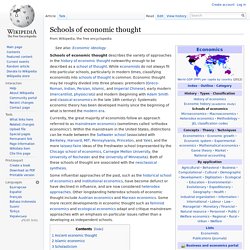
While economists do not always fit into particular schools, particularly in modern times, classifying economists into schools of thought is common. Economic thought may be roughly divided into three phases: premodern (Greco-Roman, Indian, Persian, Islamic, and Imperial Chinese), early modern (mercantilist, physiocrats) and modern (beginning with Adam Smith and classical economics in the late 18th century).
Conspicuous consumption. The sociologist and economist Thorstein Veblen coined the term “conspicuous consumption”, and was a co-founder of the institutional economics movement.
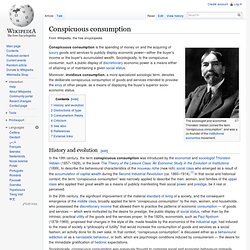
Conspicuous consumption is the spending of money on and the acquiring of luxury goods and services to publicly display economic power—either the buyer's income or the buyer's accumulated wealth. Sociologically, to the conspicuous consumer, such a public display of discretionary economic power is a means either of attaining or of maintaining a given social status. Moreover, invidious consumption, a more specialized sociologic term, denotes the deliberate conspicuous consumption of goods and services intended to provoke the envy of other people, as a means of displaying the buyer’s superior socio-economic status.
History and evolution[edit] Sociologically, conspicuous consumption was previously thought to comprise social and economic behaviours primarily practiced by rich people. Communitarianism. Communitarianism is a philosophy that emphasizes the connection between the individual and the community.
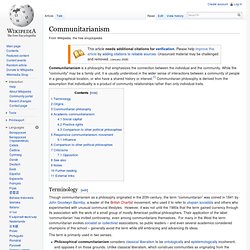
While the "community" may be a family unit, it is usually understood in the wider sense of interactions between a community of people in a geographical location, or who have a shared history or interest.[1] Communitarian philosophy is derived from the assumption that individuality is a product of community relationships rather than only individual traits. Terminology[edit] Though communitarianism as a philosophy originated in the 20th-century, the term “communitarian” was coined in 1841 by John Goodwyn Barmby, a leader of the British Chartist movement, who used it to refer to utopian socialists and others who experimented with unusual communal lifestyles. Christian anarchism. More than any other Bible source, the Sermon on the Mount is used as the basis for Christian anarchism.[4] Most Christian anarchists are pacifists and reject the use of violence, such as war.[2] Leo Tolstoy's The Kingdom of God Is Within You is often regarded as a key text for modern Christian anarchism.[2][5] Origins[edit] Old Testament[edit] Jacques Ellul recounts that at the end of the Book of Judges (Judges 21:25) there was no king in Israel and "everyone did as they saw fit".[6][7][8] Later in the first Book of Samuel (1 Samuel 8) the people of Israel wanted a king to be like other nations.[7][9] God declared that the people had rejected him as their king.
My kingdom is not of this world (John 18:36). He has brought down rulers from their thrones but has lifted up the humble (Luke 1:52). We are to obey God rather than men (Acts 5:29). To seek rule by man is to reject the rule of God (1 Samuel 8). Christians struggle against governments, rulers, and spiritual wickedness (Ephesians 6:12). Honest people are too busy making an honest living to accept political power, so only the corruptible will accept political power (Judges 9:7-15 The Parable of the Trees). The devil offers all kingdoms to Jesus in return for worshipping him.(Luke 4:5-7). So I saw all this, and applied my heart to every work that has been done under the sun; all the things wherein man has power over man to afflict him. (Ecclesiastes 8:9) And Jesus called them to him and said to them, "You know that those who are supposed to rule (Gr. archo) over the Gentiles lord it over them, and their great men exercise authority over them. But it shall not be so among you...." (Mark 10: – gehan
Tax resistance Main article: Tax resistance Some Christian anarchists resist taxes in the belief that their government is engaged in immoral, unethical or destructive activities such as war, and paying taxes inevitably funds these activities, whilst others submit to taxation. – gehan
Many Christian anarchists say that Jesus opposed the use of government power, even for supposedly good purposes like welfare. – gehan
He warned that a human king would lead to militarism, conscription and taxation, and that their pleas for mercy from the king's demands would go unanswered.
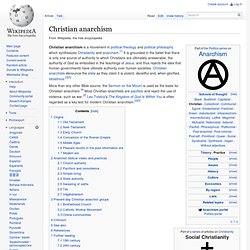
Samuel passed on God's warning to the Israelites but they still demanded a king. New Testament[edit] Sermon on the Mount. The Sermon on the Mount (anglicized from the Matthean Vulgate Latin section title: Sermo in monte) is a collection of sayings and teachings of Jesus, which emphasizes his moral teaching found in the Gospel of Matthew (chapters 5, 6 and 7).[1] It is the first of the Five Discourses of Matthew and takes place relatively early in the Ministry of Jesus after he has been baptized by John the Baptist and preached in Galilee.
Jesus condemns those who judge others before first judging themselves – gehan
Condemns the superificiality of materialism – gehan
Commentary on Ten Commandments – gehan
The Sermon is the longest piece of teaching from Jesus in the New Testament, and has been one of the most widely quoted elements of the Canonical Gospels.[2] It includes some of the best known teachings of Jesus, such as the Beatitudes, and the widely recited Lord's Prayer.
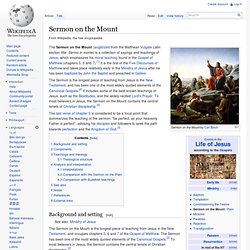
To most believers in Jesus, the Sermon on the Mount contains the central tenets of Christian discipleship.[2] Background and setting[edit] The Kingdom of God Is Within You. The 1st English edition of The Kingdom of God Is Within You.
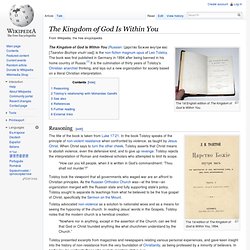
Mohandas Karamchand Gandhi. Mohandas Karamchand Gandhi (pronounced [ˈmoːɦənd̪aːs ˈkərəmtʃənd̪ ˈɡaːnd̪ʱi] ( ); 2 October 1869 – 30 January 1948) was the preeminent leader of Indian nationalism in British-ruled India.
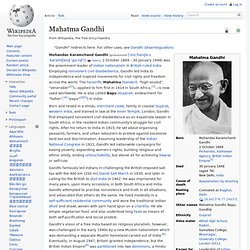
Employing nonviolent civil disobedience, Gandhi led India to independence and inspired movements for civil rights and freedom across the world. The honorific Mahatma (Sanskrit: "high-souled", "venerable"[2])—applied to him first in 1914 in South Africa,[3]—is now used worldwide. He is also called Bapu (Gujarati: endearment for "father",[4] "papa"[4][5]) in India. The Story of My Experiments with Truth. The Story of My Experiments with Truth is the autobiography of Mohandas K.
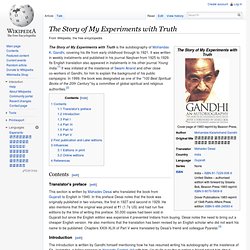
Gandhi, covering his life from early childhood through to 1921. It was written in weekly instalments and published in his journal Navjivan from 1925 to 1929. Its English translation also appeared in instalments in his other journal Young India.[1] It was initiated at the insistence of Swami Anand and other close co-workers of Gandhi, for him to explain the background of his public campaigns. In 1999, the book was designated as one of the "100 Best Spiritual Books of the 20th Century" by a committee of global spiritual and religious authorities.[2] Contents[edit] Translator's preface[edit] This section is written by Mahadev Desai who translated the book from Gujarati to English in 1940. 1 (1.7¢ US) and had run five editions by the time of writing this preface. 50,000 copies had been sold in Gujarati but since the English edition was expensive it prevented Indians from buying.
John Ruskin. John Ruskin (8 February 1819 – 20 January 1900) was the leading English art critic of the Victorian era, also an art patron, draughtsman, watercolourist, a prominent social thinker and philanthropist.
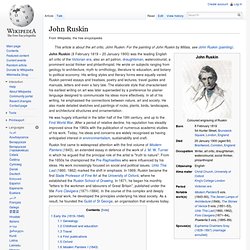
He wrote on subjects ranging from geology to architecture, myth to ornithology, literature to education, and botany to political economy. His writing styles and literary forms were equally varied. Ruskin penned essays and treatises, poetry and lectures, travel guides and manuals, letters and even a fairy tale. The elaborate style that characterised his earliest writing on art was later superseded by a preference for plainer language designed to communicate his ideas more effectively. Unto This Last. "Unto This Last" is an essay on economy by John Ruskin, first published in December 1860 in the monthly journal Cornhill Magazine in four articles.
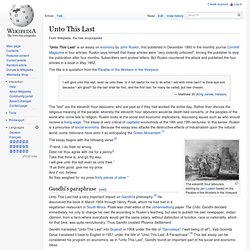
Ruskin says himself that these articles were "very violently criticized", forcing the publisher to stop the publication after four months. Subscribers sent protest letters. But Ruskin countered the attack and published the four articles in a book in May 1862. Catholic Worker Movement. The Catholic Worker Movement is a collection of autonomous[1] communities of Catholics and their associates founded by Dorothy Day and Peter Maurin in 1933. Its aim is to "live in accordance with the justice and charity of Jesus Christ. "[2] One of its guiding principles is hospitality towards those on the margin of society, based on the principles of communitarianism and personalism.
To this end, the movement claims over 213 local Catholic Worker communities providing social services.[3] Each house has a different mission, going about the work of social justice in its own way, suited to its local region. Catholic Worker houses are not official organs of the Catholic Church, and their activities, inspired by Day's example, may be more or less overtly religious in tone and inspiration depending on the particular institution. From each according to his ability, to each according to his need. Origin of the phrase[edit] The complete paragraphs containing Marx's statement of the creed in the 'Critique of the Gotha Program' is as follows: In a higher phase of communist society, after the enslaving subordination of the individual to the division of labor, and therewith also the antithesis between mental and physical labor, has vanished; after labor has become not only a means of life but life's prime want; after the productive forces have also increased with the all-around development of the individual, and all the springs of co-operative wealth flow more abundantly—only then can the narrow horizon of bourgeois right be crossed in its entirety and society inscribe on its banners: From each according to his ability, to each according to his needs!
[2][3][4] I. Louis Blanc. Louis Blanc.
In the Revue du progres, which he founded, he published in 1839 his study on L'Organisation du travail. The principles laid down in this famous essay form the key to Louis Blanc's whole political career. He attributes all the evils that afflict society to the pressure of competition, whereby the weaker are driven to the wall. He demanded the equalization of wages, and the merging of personal interests in the common good-- "à chacun selon ses besoins, de chacun selon ses facultés," which is often translated as "from each according to his abilities, to each according to his needs." This was to be affected by the establishment of "social workshops," a sort of combined co-operative society and trade-union, where the workmen in each trade were to unite their efforts for their common benefit. – gehan
Louis Jean Joseph Charles Blanc ( 29 October 1811, Madrid – 6 December 1882, Cannes) was a French politician and historian. A socialist who favored reforms, he called for the creation of cooperatives in order to guarantee employment for the urban poor. Biography[edit] Early years[edit] Tax resistance. Tax resistance is the refusal to pay tax because of opposition to the government that is imposing the tax or to government policy or as opposition to the concept of taxation in itself. Tax resistance is a form of direct action and if in violation of the tax regulations, a form of civil disobedience. Examples of tax resistance campaigns include those advocating home rule, such as the Salt March led by Mohandas Gandhi, and those promoting women's suffrage, such as the Women's Tax Resistance League.[1] Simple living. Poverty is general scarcity or dearth, or the state of one who lacks a certain amount of material possessions or money.[1] Absolute poverty or destitution refers to the deprivation of basic human needs, which commonly includes food, water, sanitation, clothing, shelter, health care and education.
Henry David Thoreau. Henry David Thoreau (see name pronunciation; July 12, 1817 – May 6, 1862) was an American author, poet, philosopher, abolitionist, naturalist, tax resister, development critic, surveyor, and historian. A leading transcendentalist,[2] Thoreau is best known for his book Walden, a reflection upon simple living in natural surroundings, and his essay Resistance to Civil Government (also known as Civil Disobedience), an argument for disobedience to an unjust state.
Jean-Jacques Rousseau. Jean-Jacques Rousseau (/ruːˈsoʊ/;[1] French: [ʒɑ̃ʒak ʁuso]; 28 June 1712 – 2 July 1778) was a Genevan philosopher, writer, and composer of the 18th century. William Morris. William Morris self-portrait, 1856. The Fellowship of the New Life. Patrick Geddes. Sir Patrick Geddes FRSE (2 October 1854 – 17 April 1932) was a Scottish biologist, sociologist, geographer, philanthropist and pioneering town planner (see List of urban theorists).
Fabian Society. Originally, the Fabian society was committed to the establishment of a socialist economy, alongside a commitment to British imperialism as a progressive and modernizing force.[3] Organisational history[edit] Help.
James Robertson (activist) James Robertson (born August 11, 1928), a British-born political and economic thinker and activist, became an independent writer and speaker in 1974 after an early career as a British civil servant. He studied Greats at Balliol College, Oxford from 1946 to 1950 where he played cricket and rugby union, and ran cross-country for the University. After serving on British Prime Minister Harold Macmillan’s staff during his "Wind of Change" tour of Africa in 1960, Robertson spent three years in the Cabinet Office. Btdc-section1. New Economics Foundation. The New Economics Foundation (NEF) is a British think-tank that promotes social, economic and environmental justice.[1] A new economic model. Monetary reform. Growth isn't Possible.
Creatingnewmoney. Small Is Beautiful. Small Is Beautiful: A Study of Economics As If People Mattered is a collection of essays by British economist E. F. Schumacher. The phrase "Small Is Beautiful" came from a phrase by his teacher Leopold Kohr.[1] It is often used to champion small, appropriate technologies that are believed to empower people more, in contrast with phrases such as "bigger is better". First published in 1973, Small Is Beautiful brought Schumacher's critiques of Western economics to a wider audience during the 1973 energy crisis and emergence of globalization. The Times Literary Supplement ranked Small Is Beautiful among the 100 most influential books published since World War II.[2] A further edition with commentaries was published in 1999.
Small Is Beautiful received the prestigious award Prix Européen de l'Essai Charles Veillon in 1976. Home.